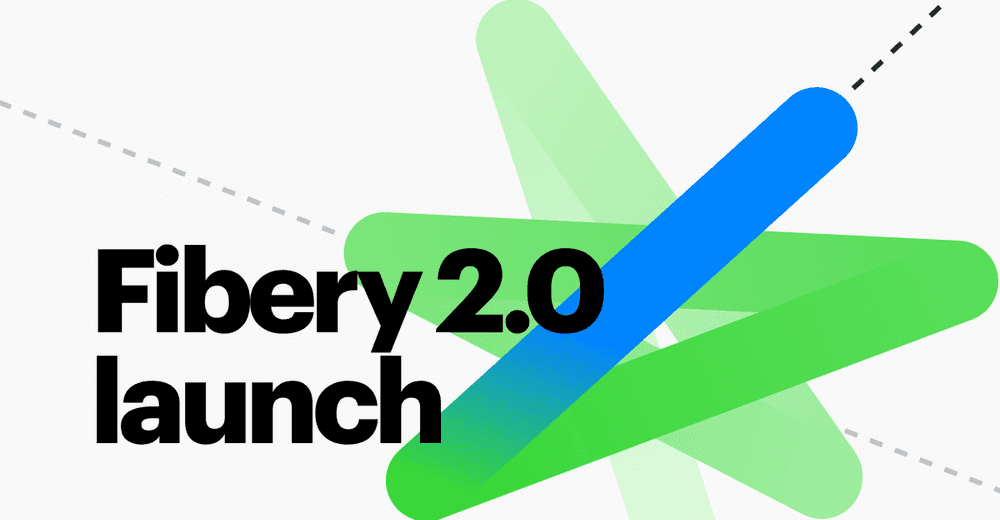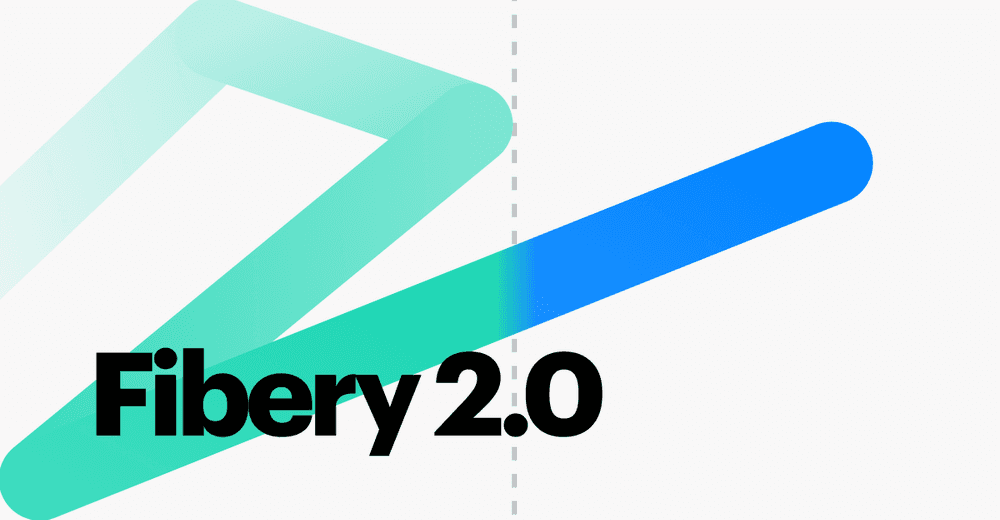Fibery Vs Notion AI: Is Fibery 2× Faster & 2× Smarter?
- Agents
- Dataset
- Accuracy
- 1. Who is off today?
- 2. Who has taken the most vacation days this year? Return top 10 people.
- 3. How much money we spend on software annually?
- 4. Analyze all recent conversations and spot repeating problems
- 5. How many in progress features we have by product area?
- 6. How many leads we have from AI and Search sources?
- Why the gap?
- Speed
- Technical Details
- Conclusion
🐙 TLDR: I asked both tools six questions on the same dataset. Fibery got 6/6 right in ~1 min on average; Notion got 3/6 right in ~2 min on average.
AI is changing how we work with information. It may be revolutionary for someone, maybe mundane for someone else, but it is happening. We search less, and we ask more. We are getting familiar with Deep Research and o3 reasoning model.
To me it is mostly about saving time. Now I can dig into new domains faster, find relevant information easier and make decisions faster (and better). Tools like Fibery or Notion store a lot of data about your company, team or domain, but it’s not trivial to turn that raw data into usable information. We rely on views and search, but views sometimes are impossible to build and search is just a first step in data processing.
AI gives us a possibility to simplify data→information path and speed it up. In a better world we can just ask questions, like these, and get the answers quickly:
- Who is off today?
- Who has taken the most vacation days this year?
- How much money we spend on software annually?
- Analyze all recent conversations and spot repeating problems
- How many in progress features we have by product area?
- How many leads we have from AI and Search sources?
Fibery, Notion and other tools recently added AI solutions (Agent, Research, etc.) to handle exactly that. But how good are they? Let’s compare Fibery and Notion AI Agents.
Agents
Notion has Ask | Research | Build tabs for AI. Here I tested Research tab only. Notion tries to answer complex questions using all the data you stored in Notion. It works relatively slow, but with a nice visual feedback.
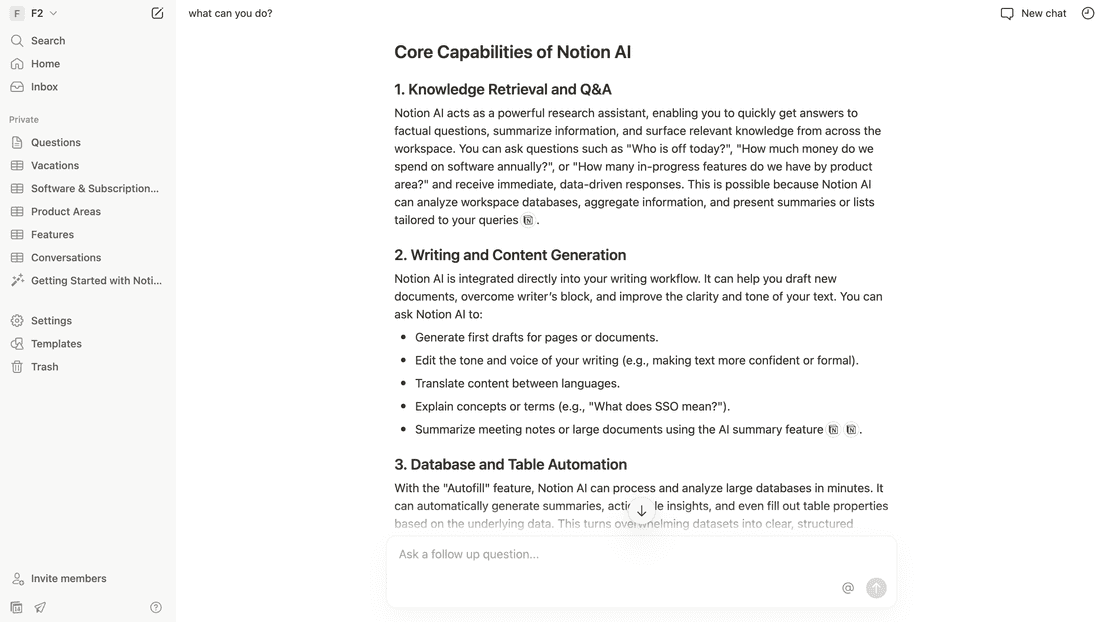
Fibery has Smart Agent mode. It also tries to answer all questions using all the data you stored in Fibery. And it also works relatively slow. So far so good.
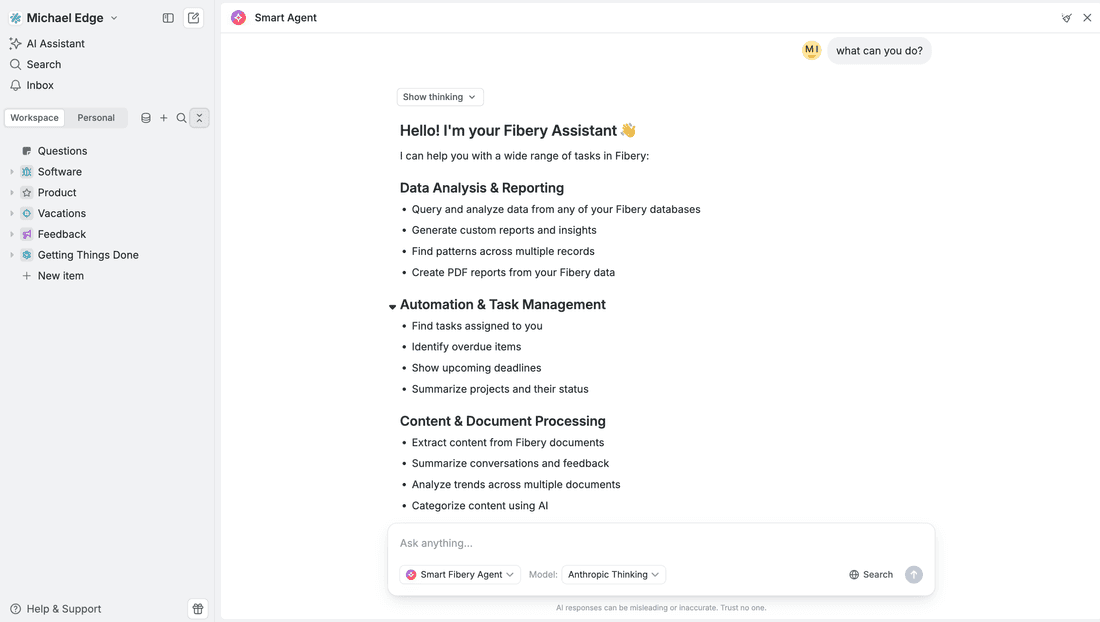
Are there any differences? Well, there is. First, let’s check the most important thing — answers accuracy.
Dataset
I uploaded the same data to Fibery and Notion instances. Both tools have exactly the same databases to store Vacations, Software subscriptions, Conversations, Product Areas and Features. In the last case I used 15K+ records to see how both tools can handle it.
There are several databases with not so many fields:
- Vacations: 188 vacation records with vacation start and end date, and half-day checkbox.
- Software Inventory: 75 software records with quite many fields, including currency, fee, billing frequency, country, status etc.
- Conversations: 10 conversations with some content in rich text (real conversations)
- Product Areas and Features: 85 product areas and 265 features linked together via a one-many relation. Basic fields like state, effort, etc.
- Leads: 16K leads with just four fields: name, source, source score and status
Accuracy
TIP: Notion has troubles with the correct database detection, and database description helps. So if you see that Notion fails to find the right database for the answer, add some short description to a database.
Let’s try six simple questions above and see how Fibery and Notion will reply. Timing is average from 3 runs.
1. Who is off today?
Notion: 1m 20s, ✔️ correct answer
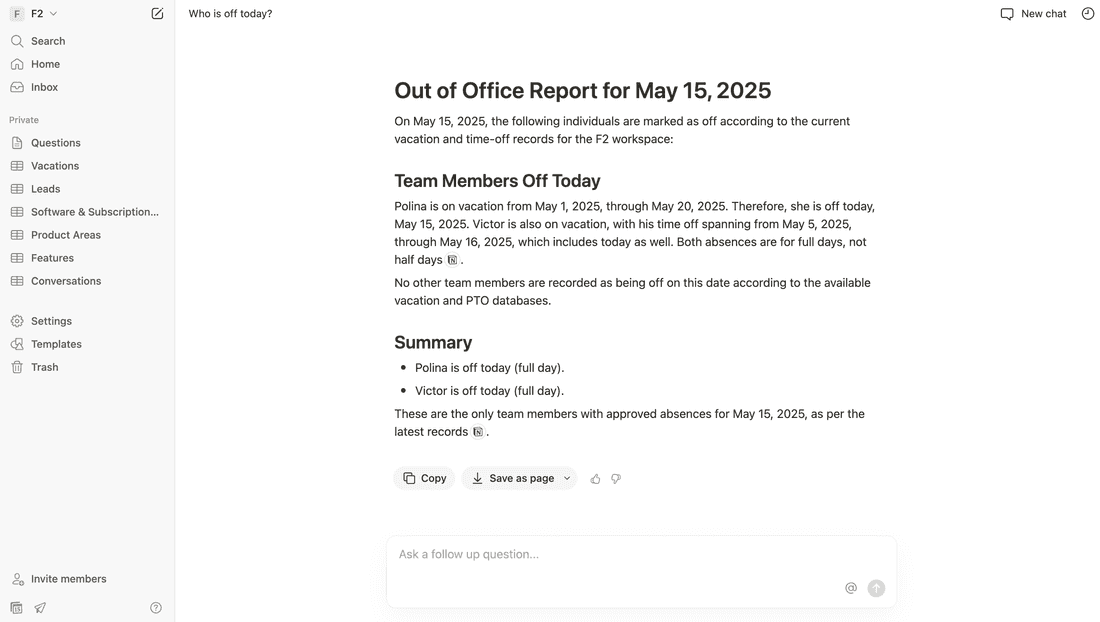
Fibery: 0m 40s, ✔️ correct answer
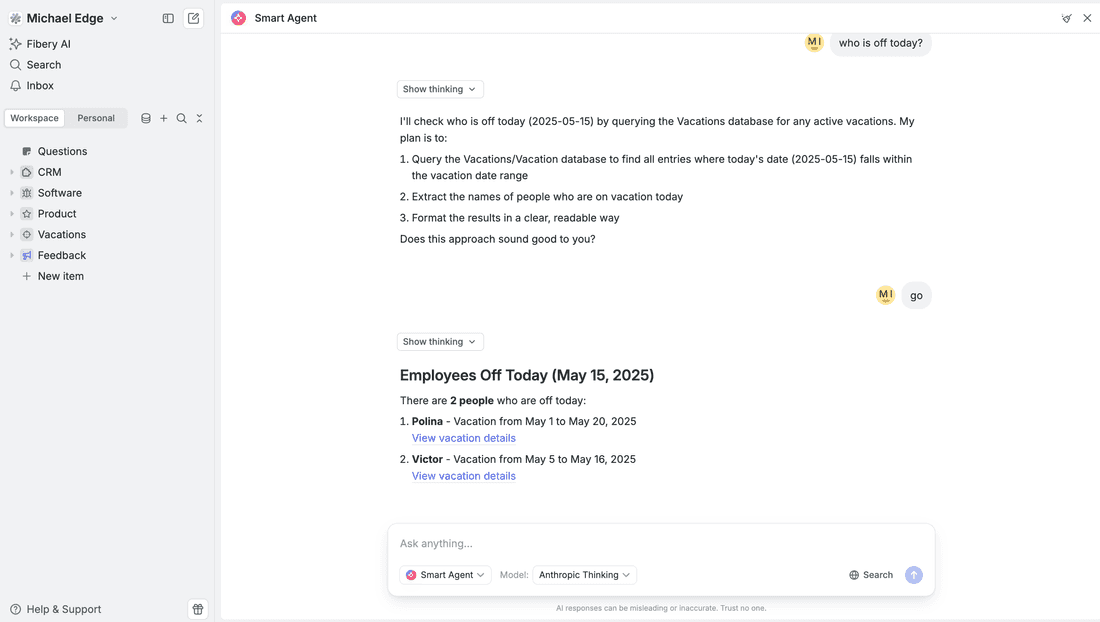
2. Who has taken the most vacation days this year? Return top 10 people.
Notion: 1m 30s, ❌ incorrect answer, calculations are slightly off
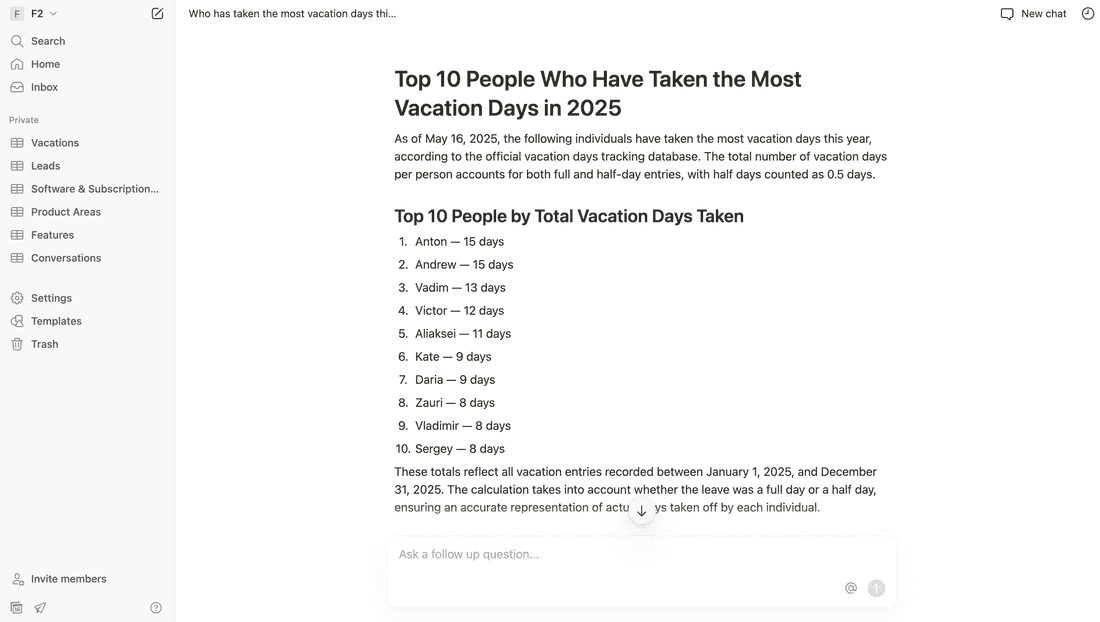
Fibery: 0m 50s, ✔️ correct answer
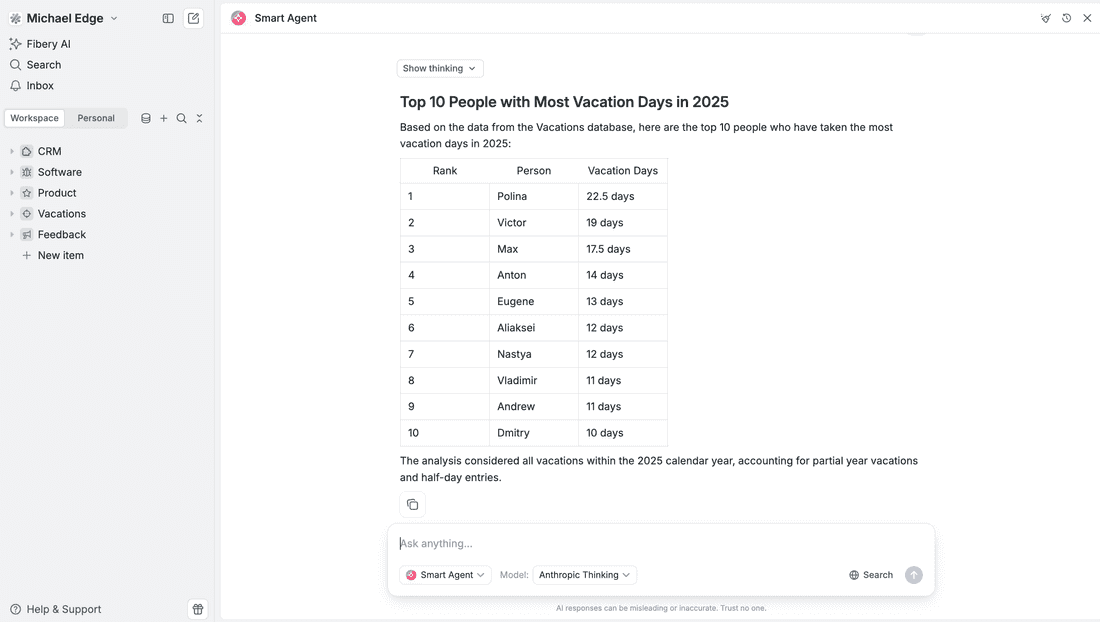
3. How much money we spend on software annually?
Notion: 2m 20s, ✔️ correct answer
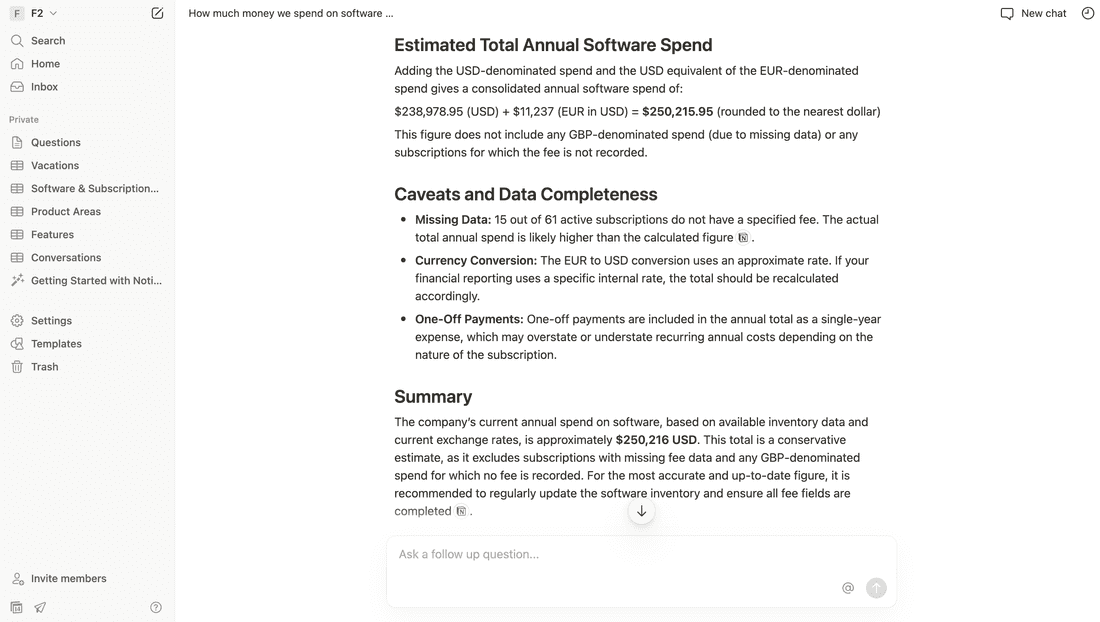
Fibery: 0m 50s, ✔️ correct answer
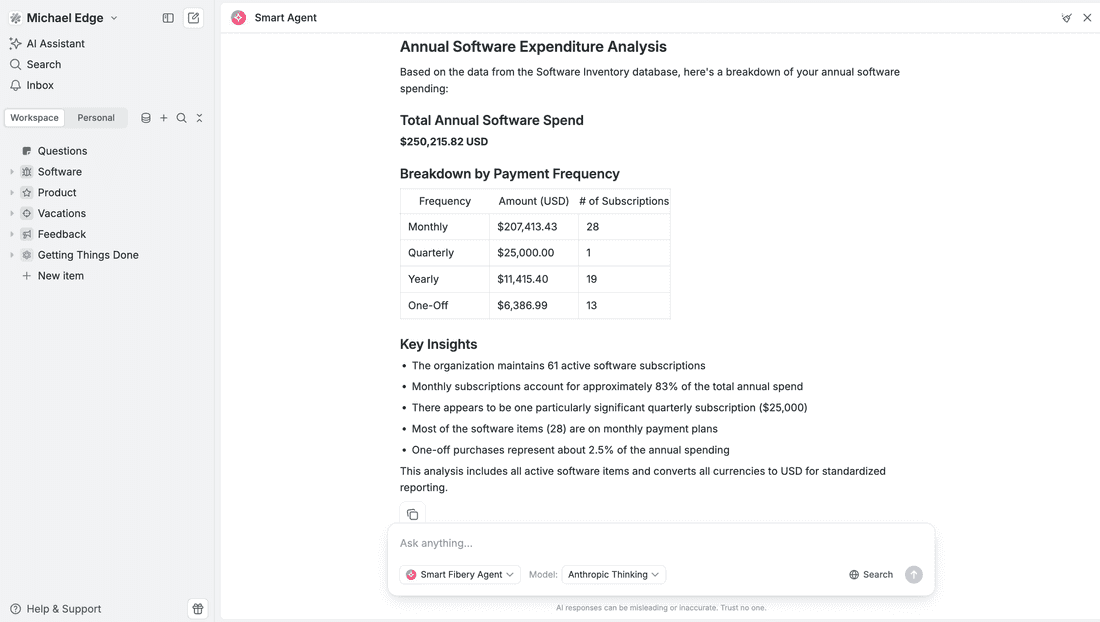
4. Analyze all recent conversations and spot repeating problems
Notion: 2m 15s, ✔️❌ some answer (well, can be tolerated, but content is not very useful)
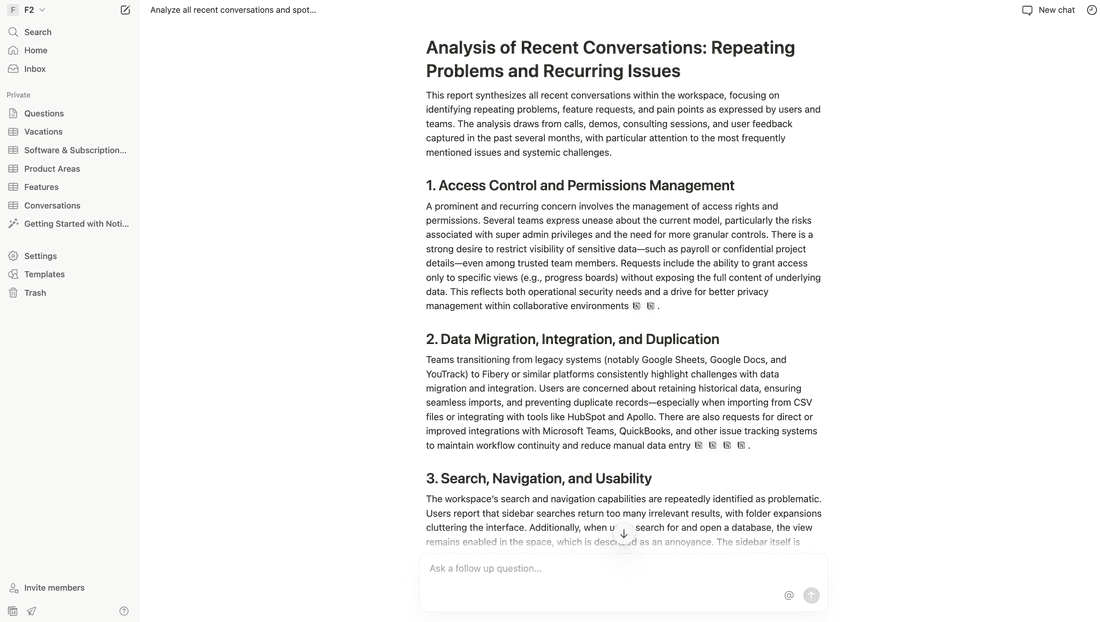
Fibery: 1m 50s, ✔️ better answer, more details
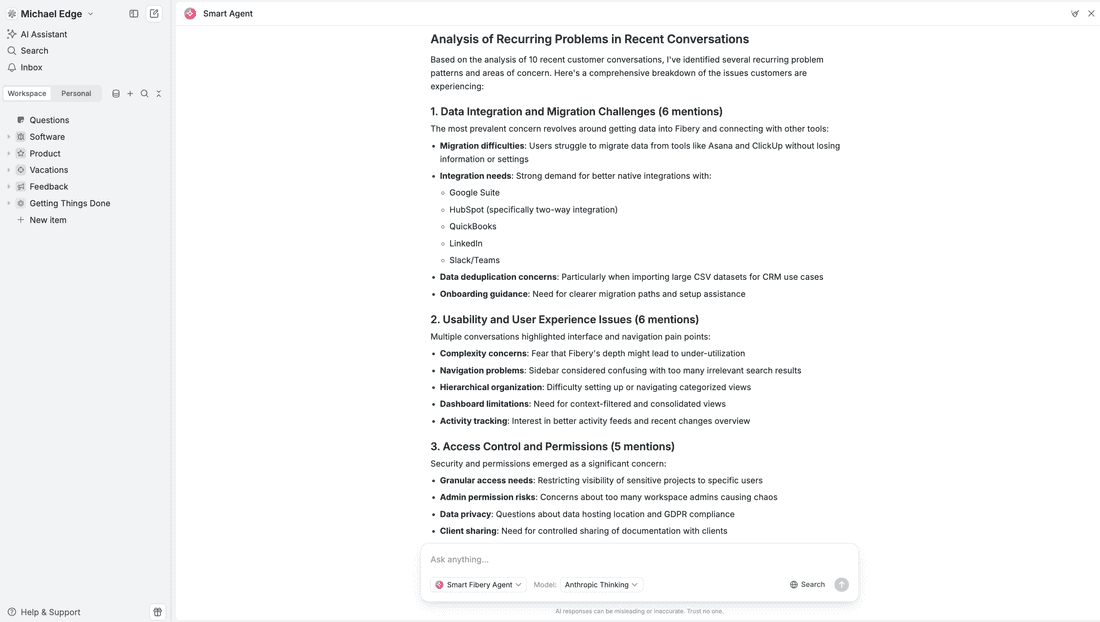
5. How many in progress features we have by product area?
Let’s test a dataset with relations (Product Area → Features).
Notion: 2m 55s, ❌✔️ numbers are correct, but no names of product areas
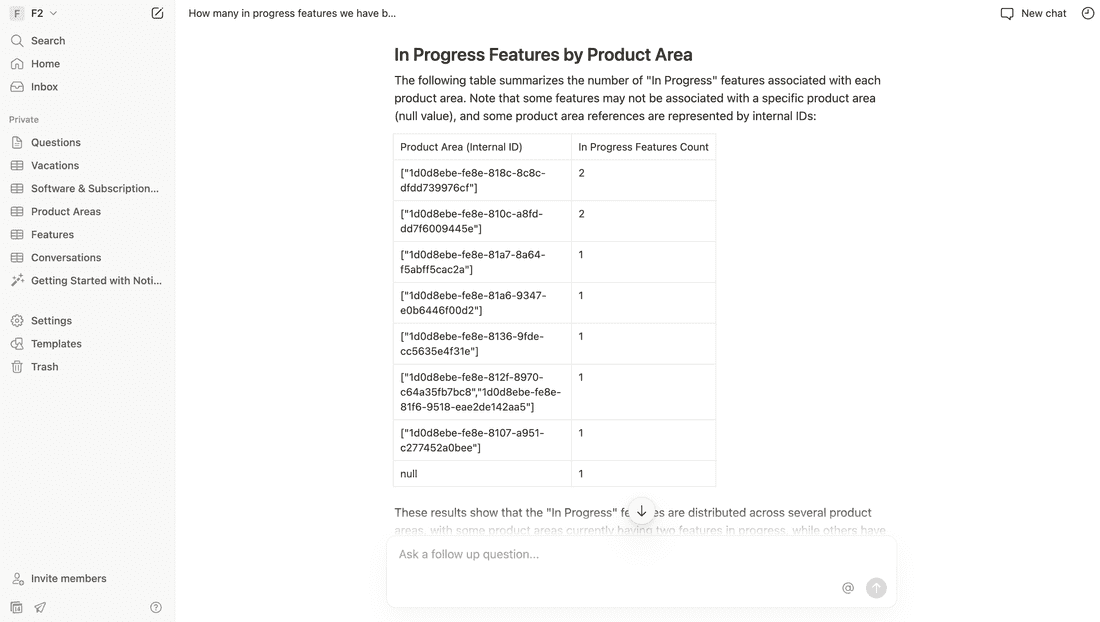
Fibery: 0m 35s, ✔️ correct answer
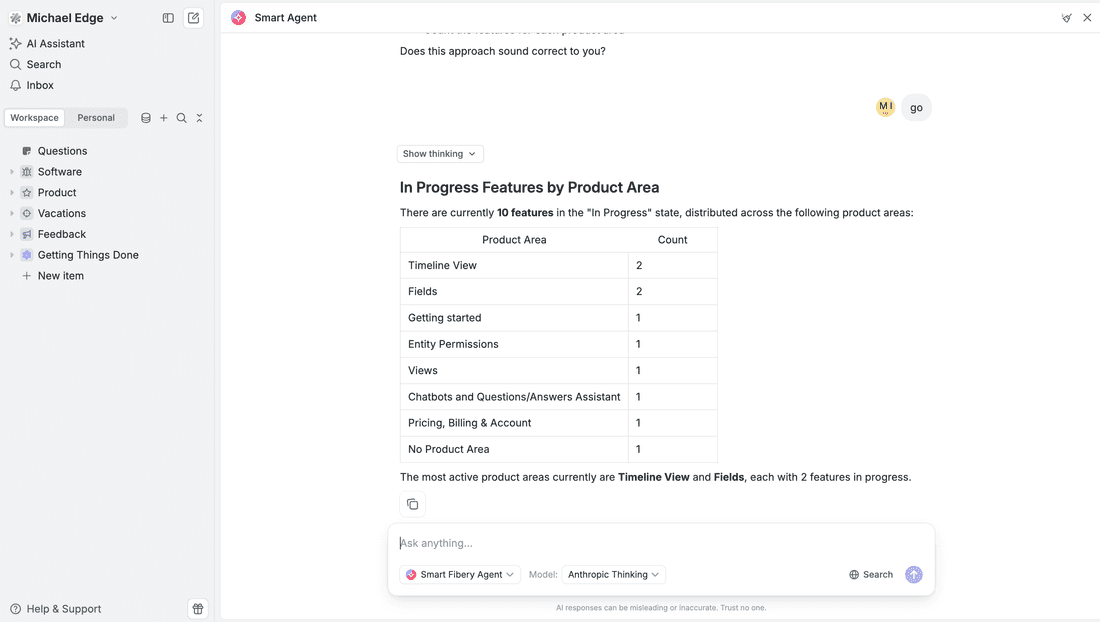
6. How many leads we have from AI and Search sources?
Let’s test some large dataset, above 10K.
Notion: 1m 30s, ❌ incorrect, AI category is incomplete
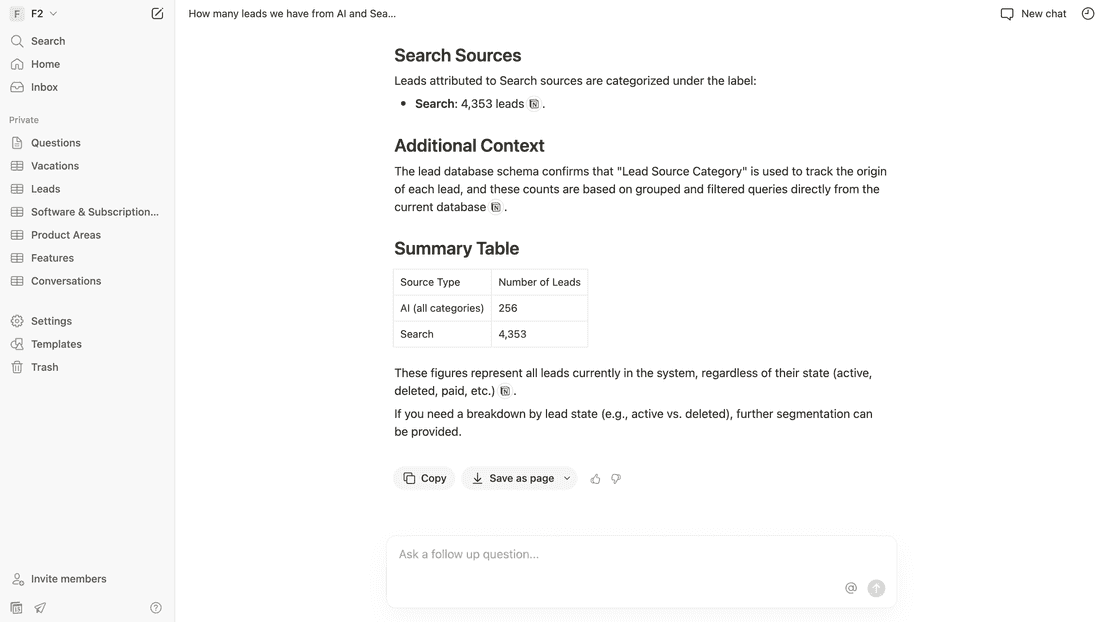
Fibery: 0m 55s, ✔️ correct answer
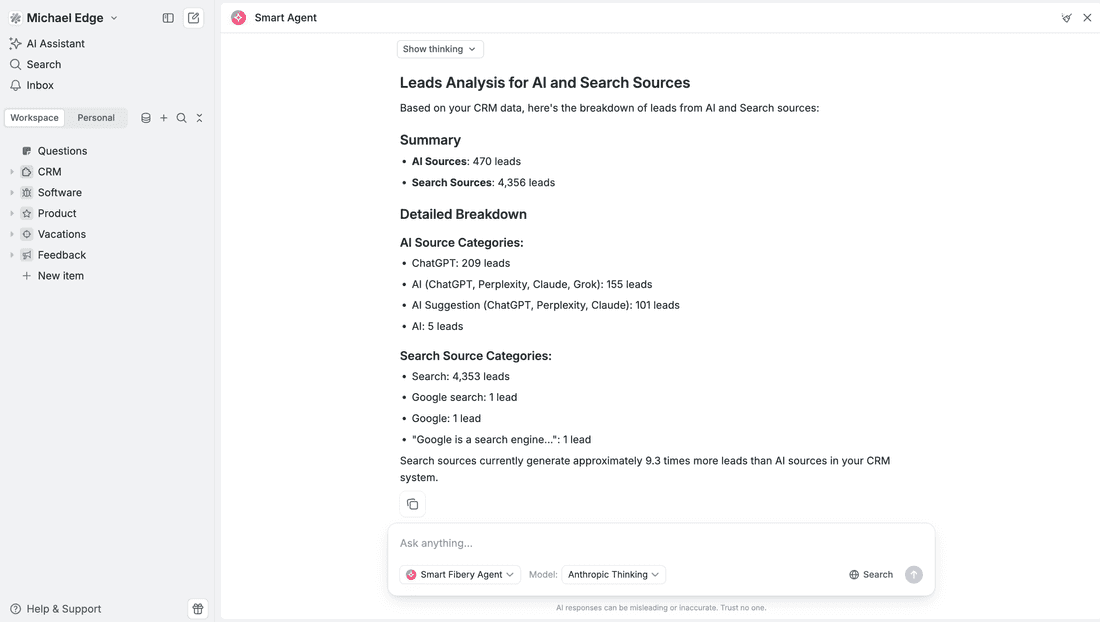
Why the gap?
I was quite surprised that Notion can’t handle many questions well, taking into consideration all the resources it has. Relations are very problematic for Notion, maybe due to internal implementation. When Notion tried to reply to the last questions, relations were mentioned as IDs and it failed to get real names of related entities.
I also noticed Notion AI does many very strange requests to data and tries to find information in weird places. For example, in the last question about leads Notion queried Conversations records several times. Maybe it is tuned to operate on text content more than on database structure and always tries to find text first.
Speed
In most cases Fibery is faster. When question is about relations, Notion is always very slow. These numbers are average for 3 runs.
| Question | Notion | Fibery |
| Who is off today? | 1:20 ✔️ | 0:40 ✔️ |
| Who has taken the most vacation days this year? | 1:30 ❌ | 0:50 ✔️ |
| How much money we spend on software annually? | 3:10 ✔️ | 0:50 ✔️ |
| Analyze all recent conversations and spot repeating problems | 2:15 ✔️❌ | 1:50 ✔️ |
| How many in progress features we have by product area? | 2:55 ❌✔️ | 0:35 ✔️ |
| How many leads we have from AI and Search sources? | 1:30 ❌ | 0:55 ✔️ |
Technical Details
I don’t really know how Notion works inside. Fibery Smart Agent writes JavaScript code to create the pipeline and execute it on top of Fibery. It has many tools to use, like query, getDocumentsContent, enrichWithSemanticField, findRecurringSemanticPatterns and uses these tools in quite clever way. For example, when we need to process a lot of text, Fibery Agent writes some prompt and runs this prompt on all docs, thus it can find patterns and extract information in a very efficient way.
Conclusion
Fibery Smart Agent answered 6/6 questions correctly and averaged ~1 min per query. Notion Research nailed 3/6 and averaged ~2 min per query.
Quality of replies in Notion is not good enough. Fibery Smart Agent works faster, provides more accurate answers and can handle large amount of data to answer the questions.
🎣 P.S. Prove me wrong! Try Fibery and Fibery Smart Agent for yourself.
Psst... Wanna try Fibery? 👀
Infinitely flexible product discovery & development platform.
